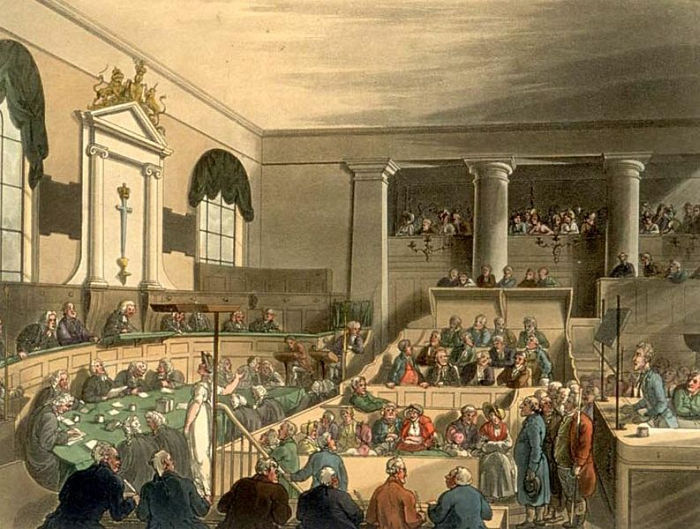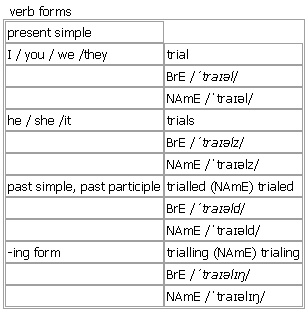|
Từ điển Oxford Advanced Learner 8th
 trial
trial

trial [trial trials trialled trialed trialling trialing] noun, verb BrE [ˈtraɪəl] NAmE [ˈtraɪəl]
noun
LAW
1. uncountable, countable a formal examination of evidence in court by a judge and often a ↑jury, to decide if sb accused of a crime is guilty or not
•a murder trial
• He's on trial for murder.
•She will stand trial/go on trial for fraud.
• The men were arrested but not brought to trial.
•The case never came to trial.
•She is awaiting trial on corruption charges.
•He did not receive a fair trial.
•She was detained without trial.
•Parker was committed for trial yesterday at Southwark Crown Court.
TEST
2. countable, uncountable the process of testing the ability, quality or performance of sb/sth, especially before you make a final decision about them
• The new drug is undergoing clinical trials.
• She agreed to employ me for a trial period.
•The system was introduced on a trial basis for one month.
•a trial separation (= of a couple whose marriage is in difficulties)
•We had the machine on trial for a week.
•a trial of strength (= a contest to see who is stronger)
IN SPORT
3. countable, usually plural (BrE) (NAmE try·out)a competition or series of tests to find the best players for a sports team or an important event
•Olympic trials
FOR ANIMALS
4. countable, usually plural an event at which animals compete or perform
•horse trials
DIFFICULT EXPERIENCE
5. countable an experience or a person that causes difficulties for sb
•the trials and tribulations of married life
•~ to sb She was a sore trial to her family at times.
Word Origin:
late Middle English (as a noun): from Anglo-Norman French, or from medieval Latin triallum. The verb dates from the 1980s.
Culture:
juries
Under the legal system of England and Wales, and also that of Scotland, a person accused of a serious crime who pleads ‘not guilty’ to the crime will be tried by a jury. Juries also hear some civil cases (= disagreements between people about their rights) and decide whether a person is ‘liable’ (= required by law to do or pay something) or ‘not liable’. In the US juries are also used in both criminal and civil cases, though the rules vary from state to state.
In Britain jurors (= jury members) are selected at random for each trial from lists of adults who have the right to vote. They must be between the ages of 18 and 70 and have lived in Britain for at least five years. Members of the armed forces, the legal profession and the police force are not allowed to sit on juries. Anybody called for jury service usually has to attend court for about two weeks, although some cases may go on for much longer. The court pays only their expenses and if they have a job they are paid as normal by their employer. In England and Wales 12 people sit on a jury, in Scotland 15. A larger number of people are asked to attend court and the final jury is selected at random from among them. Lawyers representing either side in a case have the right to object to a particular person being on the jury.
After the jury has heard the evidence presented by both sides, it retires to the jury room, a private room, to discuss the case. When all members of the jury agree they return their verdict, go back into court and say whether the accused is guilty or not guilty. In Scotland they can also return a verdict of not proven, which means that guilt in the case has not been proved and the accused can go free. The verdict is announced by the foreman (= the person chosen by the jury as their leader). Sometimes the jury cannot all agree and the judge may accept a majority verdict, provided that no more than two members of the jury disagree. If no verdict is reached the trial is abandoned and started again with a different jury. It is not the responsibility of the jury to decide ↑punishment, though in certain civil cases they may decide how much compensation should be paid.
In the US most juries have 12 members, though some have only six. Otherwise the system is very similar to that in England and Wales. When people are called for jury duty they must go, but people who cannot leave their jobs or homes can be excused. Before a trial begins lawyers ask questions to see if jurors are impartial, i.e. do not have strong opinions that would prevent them making a decision based on the facts. Lawyers can challenge for cause, if they can give the judge a good reason why somebody should not be a juror. They also have a number of peremptory challenges which means they can object to somebody without giving a reason. In some trials it can be difficult to find 12 people who are impartial, especially if a case has received a lot of publicity. Lawyers sometimes do research to find out what kind of person is most likely to support their side, and use challenges to keep other people off the jury. In a criminal trial the jury decides whether the accused person is guilty or innocent, but does not decide on a punishment. In a civil trial they may decide how much money should be paid in compensation. A majority decision is usually acceptable.
Collocations:
Criminal justice
Breaking the law
break/violate/obey/uphold the law
be investigated/arrested/tried for a crime/a robbery/fraud
be arrested/ (especially NAmE) indicted/convicted on charges of rape/fraud/(especially US) felony charges
be arrested on suspicion of arson/robbery/shoplifting
be accused of/be charged with murder/(especially NAmE) homicide/four counts of fraud
face two charges of indecent assault
admit your guilt/liability/responsibility (for sth)
deny the allegations/claims/charges
confess to a crime
grant/be refused/be released on/skip/jump bail
The legal process
stand/await/bring sb to/come to/be on trial
take sb to/come to/settle sth out of court
face/avoid/escape prosecution
seek/retain/have the right to/be denied access to legal counsel
hold/conduct/attend/adjourn a hearing/trial
sit on/influence/persuade/convince the jury
sit/stand/appear/be put/place sb in the dock
plead guilty/not guilty to a crime
be called to/enter (BrE) the witness box
take/put sb on the stand/(NAmE) the witness stand
call/subpoena/question/cross-examine a witness
give/hear the evidence against/on behalf of sb
raise/withdraw/overrule an objection
reach a unanimous/majority verdict
return/deliver/record a verdict of not guilty/unlawful killing/accidental death
convict/acquit the defendant of the crime
secure a conviction/your acquittal
lodge/file an appeal
appeal (against)/challenge/uphold/overturn a conviction/verdict
Sentencing and punishment
pass sentence on sb
carry/face/serve a seven-year/life sentence
receive/be given the death penalty
be sentenced to ten years (in prison/jail)
carry/impose/pay a fine (of $3 000)/a penalty (of 14 years imprisonment)
be imprisoned/jailed for drug possession/fraud/murder
do/serve time/ten years
be sent to/put sb in/be released from jail/prison
be/put sb/spend X years on death row
be granted/be denied/break (your) parole
more collocations at ↑crime
Collocations:
Scientific research
Theory
formulate/advance a theory/hypothesis
build/construct/create/develop a simple/theoretical/mathematical model
develop/establish/provide/use a theoretical/conceptual framework
advance/argue/develop the thesis that…
explore an idea/a concept/a hypothesis
make a prediction/an inference
base a prediction/your calculations on sth
investigate/evaluate/accept/challenge/reject a theory/hypothesis/model
Experiment
design an experiment/a questionnaire/a study/a test
do research/an experiment/an analysis
make observations/measurements/calculations
carry out/conduct/perform an experiment/a test/a longitudinal study/observations/clinical trials
run an experiment/a simulation/clinical trials
repeat an experiment/a test/an analysis
replicate a study/the results/the findings
observe/study/examine/investigate/assess a pattern/a process/a behaviour/(especially US) a behavior
fund/support the research/project/study
seek/provide/get/secure funding for research
Results
collect/gather/extract data/information
yield data/evidence/similar findings/the same results
analyse/examine the data/soil samples/a specimen
consider/compare/interpret the results/findings
fit the data/model
confirm/support/verify a prediction/a hypothesis/the results/the findings
prove a conjecture/hypothesis/theorem
draw/make/reach the same conclusions
read/review the records/literature
describe/report an experiment/a study
present/publish/summarize the results/findings
present/publish/read/review/cite a paper in a scientific journal
Example Bank:
•A new stocktaking system is currently under trial at the supermarket.
•A series of show trials of former senior officials of the ousted regime took place.
•A trial date has been set for May 10.
•As a journalist he attended every murder trial of note.
•Four people had been arrested and committed for trial.
•Gates played his second trial game in midfield.
•He had a trial with Chelsea when he was young.
•He is in prison awaiting trial on drugs charges.
•He never came to trial for the robbery.
•Human trials of the vaccine could begin within two years.
•If clinical trials are successful the drug could be on the market early next year.
•More than a hundred witnesses gave evidence at the trial.
•Murder trial told of horrific attack.
•My first day at work was a trial by fire.
•Opposition leaders had been jailed without trial.
•She agreed to employ me for a trial period.
•She died before the case came to trial.
•She does not believe she got a fair trial.
•She faces trial for murder.
•She is presently on trial at the Old Bailey.
•She was a real trial to her family at times.
•The President may simply be floating a trial balloon.
•The couple agreed on a trial separation.
•The dispute was regarded as a trial of strength by the unions.
•The judge halted the trial when it emerged witnesses had been threatened.
•The judge ordered a new trial on the grounds that evidence had been withheld.
•The letters that were shown during his trial turned out to be forgeries.
•The men claim they did not receive a fair trial.
•The new system will be introduced on a trial basis.
•The president faces trial by television tonight when he takes part in a live debate.
•The rebels were brutally executed after summary trials.
•The trial collapsed after a key prosecution witness admitted lying.
•The trial showed a dramatic reduction in side effects.
•The trial was told that death threats had been made against him.
•There's a 30-day free trial of the software available.
•They are treating the trip as a trial run for their 500-mile sponsored ride later this month.
•They are treating this as a trial run for their marathon later this month.
•Three people are to stand trial over the deaths of a young couple.
•We discovered the ideal mix of paint by trial and error.
•We've got this vacuum cleaner on ten days' free trial.
•You can download a free 30-day trial version of the software.
•a trial involving hundreds of patients
•As a teenager, he had trials for several top clubs.
•At the moment, I'm just concentrating on the Olympic trials next month.
•Children learn to use computer programs trial and error.
•He's on trial for murder.
•Scientists have reported encouraging results in trials of the new GM rice.
•She just missed selection when she came third in the trials.
•She will stand trial for fraud.
•The men were arrested but not brought to trial.
Idiom: ↑trial and error
verb (-ll-, NAmE)-l-)transitive, intransitive ~ (sth) (BrE)
to test the ability, quality or performance of sth to see if it will be effective or successful
Verb forms: 
Word Origin:
late Middle English (as a noun): from Anglo-Norman French, or from medieval Latin triallum. The verb dates from the 1980s.
See also: ↑tryout
|
|
|
▼ Từ liên quan / Related words
Related search result for "trial"
|
|
